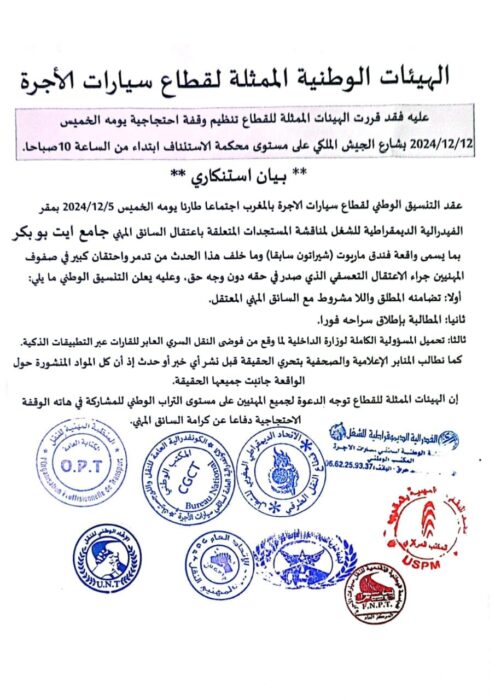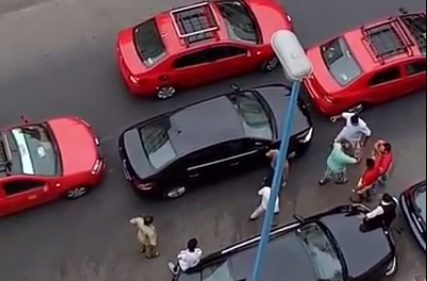Much has been written about the incident. It took place on the night of November 30 to December 1. Eduard Zernin, President of the Russian Grain Exporters and Producers Union (Rusgrain Union), was on a trip to Casablanca, where the previous day he had signed an economic memorandum of understanding, when he experienced a mishap well known to the people of Casablanca who use chauffeur-driven car (Voiture de transport avec chauffeur, VTC) applications to get around.
After ordering a car from the Marriott Hotel on Avenue des FAR, the Russian official and his wife climb aboard. The vehicle was soon surrounded by cab drivers who prevented it from moving. The altercation between the various people present finally prompted the police to intervene. After several arrests and a visit to the public prosecutor’s office, the investigating judge at the Casablanca Court of Appeal decided to prosecute four people, including a cab driver who was detained in Oukacha (Casablanca’s prison).
Taxis united
From the outset of the case, which bordered on a diplomatic incident, the majority of unions representing cab drivers expressed their solidarity with their colleague. « We respect everyone, whatever their nationality, Moroccan or foreign, in accordance with international human rights conventions. But at the same time, we say to any foreign national who sets foot in Morocco that he must respect its laws. The app that this Russian businessman used is illegal« , says Mohamed Fadde, first national vice-secretary of the cab sector union of the National Union of Labor in Morocco (Union nationale du travail au Maroc, UNTM), contacted by TelQuel.
It’s the umpteenth incident between a cab driver and a VTC driver. But this time, the customer in the middle of the altercation is a Russian official, giving this case an unusual magnitude and reminding us of the total vagueness in which the… pic.twitter.com/1AyRHausNY
– TelQuel (@TelQuelOfficiel) December 19, 2024
In a statement issued over the weekend, a union coordination denounced the arrest of cab driver A.J., which they deemed « arbitrary« , and expressed its « absolute and unconditional solidarity » with him. Calling for his « immediate release« , the unions announced a protest rally in front of the Casablanca Court of Appeal on the morning of December 12. Sector unions affiliated to the UNTM, UGTM, CDT and FDT have announced their participation.

« The driver is a victim of the non-application of the law. It’s not normal for a cab driver who has a trustworthy license, a professional card and all the necessary authorizations to languish in prison, while the person responsible (the private car driver, editor’s note) is at liberty and can come and go as he pleases« , laments Mohamed Fadde.
For him, the private car driver, « one of the essential elements of this crime« , must also be heard by the examining magistrate. The detained cab driver, on the other hand, « was simply defending his daily livelihood » against a person who is in « absolute illegality ».
The Ministry of the Interior had previously issued a circular in which it reaffirmed that all chauffeur driven car apps operating in Morocco were illegal and had no authorization to work, » recalls the trade unionist. But the courts have opened an investigation into this incident and we trust them to ensure that everyone gets what they deserve.«
Recurring incidents
This incident is far from isolated. In Morocco, cab drivers are firmly opposed to the legalization of private cars. To counter this, some cabs are surrounding vehicles they suspect of working with applications such as Careem, InDrive, Yango or even Uber, when the multinational was still present in Morocco.
And these incidents often turn ugly, as was the case on March 12 at the Oasis, when one cab driver climbed onto the windscreen of a vehicle while a customer was inside, while another tried to open the driver’s door while banging on the window. The scene, filmed by theprivate driver, made the rounds on the Internet, prompting the Casablanca police to react.

« Citizens bear the brunt of these incidents all the time, but we don’t hear about them, » assures Samir Faraby, secretary general of the pro-private car Democratic Transport Union (Syndicat démocratique du transport, SDT), contacted by TelQuel.« Several complaints have been lodged against people who claim to be affiliated with the cab sector and who take the liberty of posing as police officers. Several of them have received prison sentences or suspended sentences« , he continues.
« Previously, when this kind of incident occurred, cab drivers were generally not bothered. But we were recently received by the Casablanca Prefecture of Police, who listened to our point of view, and today we thank them because we are seeing fewer and fewer similar incidents. It’s a positive thing« , says Faraby.
The « dream » of legalization
Nevertheless, to put an end to these incidents once and for all and « enable Moroccan citizens to travel in complete safety« , Samir Faraby insists on the urgent need to adopt a law governing the private car sector. « Several other African countries, such as Senegal and Côte d’Ivoire, have legalized this activity. It is shameful for Morocco, which is preparing to host the African Cup of Nations and the World Cup, among other international events, to stand idly by« , he believes.
« In Europe, where many of our tourists come from, everyone uses these apps. We live in a time of technology, and these people want to take us backwards, » he denounces.
For the cab unions, any legalization would have to concern only drivers who have a trusted driver’s license. But for Samir Faraby, « taxi drivers alone can’t meet the demand from chauffeur driven car apps. The failure of Heetch is proof of this. It wanted to work within the legal framework by relying solely on cabs, and all it did was lose its money« .
To push for legalization, the SDT has written to Transport Minister Abdessamad Kayouh and hopes to obtain a meeting in the next few days. It is also stepping up contacts with parliamentary groups in an attempt to question the Head of Government and the Ministers of the Interior and Transport on the subject. A year ago, the former minister Mohammed Abdeljalil had already been questioned in Parliament: at the time, he announced that a study would be launched in 2024 with the aim of « rethinking national mobility with an integrated vision inside and outside cities« , without saying more.
And last July, the study had still not been launched: government spokesman Mustapha Baitas was still talking about it in the future. « This government lacks the guts to try and make a definitive decision on this issue and legalize this activity, which has existed in Morocco for ten years. No one in charge has tried to do anything for this sector, which creates enormous job opportunities« , says Samir Faraby.
According to Faraby, workers in this sector are ready to help « feed the state coffers by paying taxes« , without asking for « any public support, as is the case today for all other forms of transport« . Private drivers « just want to be legally recognized, and are even ready to switch to hybrid or electric vehicles to be more environmentally friendly« , he assures us. He concludes: « We won’t stop writing to the parties concerned, until this dream of legalization becomes a reality.«
Written by Ghita Ismaili. Edited in English by S.E.




